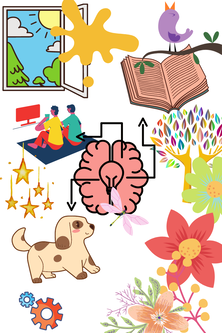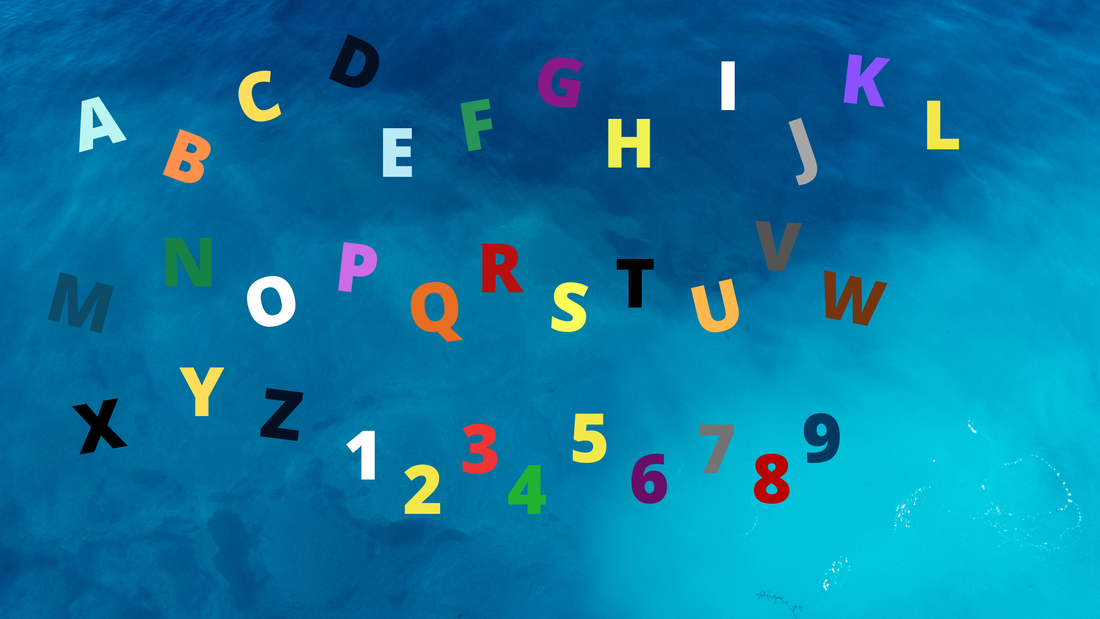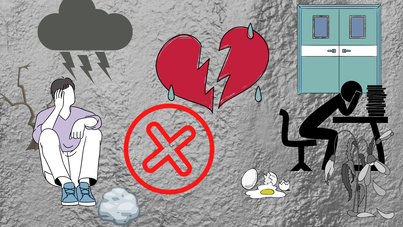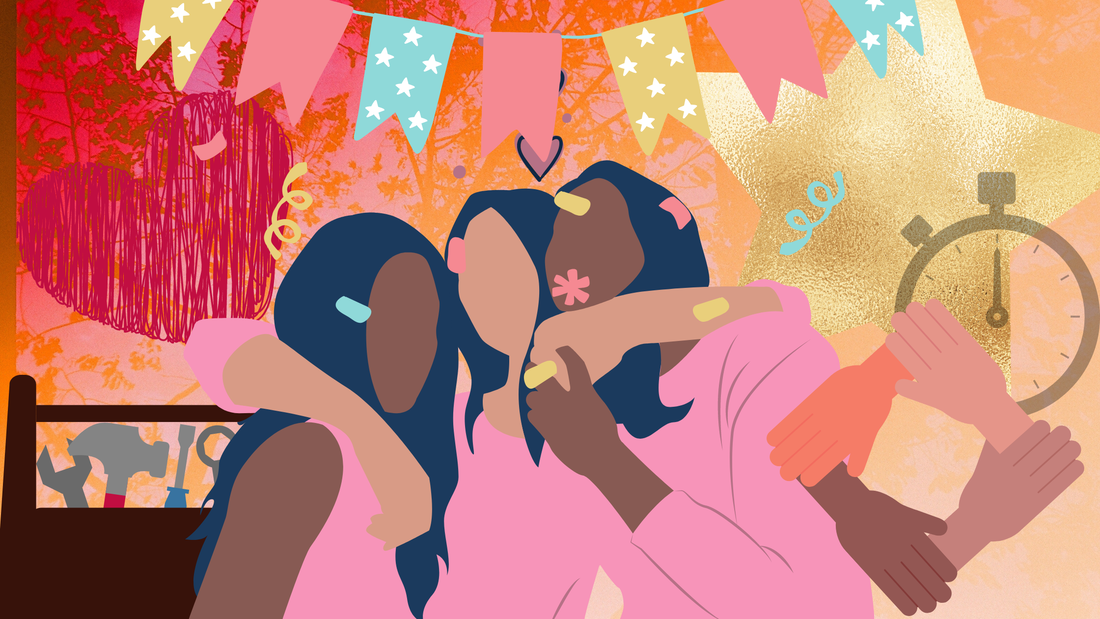 Tha brataichean beaga anns an lios agam. Tha na brataichean beaga a tha seo ann airson sealltainn gu bheil rudan ann nach fhaic thu. Agus ‘s ann mar sin a tha daoine cuideachd, tha rudan ann nach fhaic thu. Chan eil mi air facal fhaicinn anns a’ Ghàidhlig airson ‘neurodiversity’ ach ‘s e facal gu math ùr anns a’ Bheurla cuideachd. Tha am faclair Merriam Webster ag ràdh gur ann ann an 1998 a bha am facal air a chleachdadh airson a’ chiad uair. (https://www.merriamwebster.com/dictionary/neurodiversity 3 Mhàrt 2021) ‘S dòcha gun cleachd sinn niùro-iomadachd a stèidhichte air am facal bith-iomadachd (biodiversity). Ach, dè tha niùro-iomadachd a’ ciallachadh co-dhiu? Air ais gu Merriam Webster, “individual differences in brain functioning regarded as normal variations within the human population” (https://www.merriam-webster.com/dictionary/neurodiversity, 3 Mhàrt 2021). Tha na diofaran seo a’ gabhail a-steach rudan mar Mì-rianan Speactram Autism, ADHD, dyslexia, Tourette's, synesthesia, is eile ( https://www.psychologytoday.com/us/basics/neurodiversity , 3 Mhàrt 2021). Tha am facail niùro-iomadachd a’ ciallachadh cuideachd a bith smaoineachadh air na diofaran seo mar diofaran nàdarra an àite rudan a tha ceàrr le duine agus spèis a toirt do luchd-niùiro-ionmadach. ‘S e neach niùro-iomadach a th’ annam. Tha dyslexia, ADHD agus synesthesia agam. Bidh mi a’cleachdadh agam an àite orm oir ‘s e diofaran maireannach a th’ annta. ‘S e synesthesia am fear as spòrsaile dhiubh. Tha synesthesia a’ ciallachadh gum bidh na diofar pàirtean den eanchainn ceangailte ann an dòigh eadar-dhealaichte. Dhòmhsa tha sin a’ ciallach gu bheil dath agam airson gach litir agus gach àireamh ach tha diofar seòrsaichean de synesthesia ann. Airson tuilleadh fios cuir sùil air an artaigil seo bho Britannica: https://www.britannica.com/science/synesthesia Tha an fheadhainn eile rud beag nas doirbhe. ‘S e ‘doille-fhaclan’ am facal a tha ri fhaighinn anns an fhaclair airson dyslexia, ach cha chleachd mi e. Chan ann an sin ach eadar-theangachadh de seann ainm Beurla. Cha bhith daoine a’ cleachdadh an t-ainm sin anns a’ Bheurla a chionns nach eil e freagarrach, agus a chionn s gu bheil e seann fhasanta agus tuilleadh ‘s ro shìmplidh. ‘S e duilgheadas le litreachadh, sgrìobhadh agus leughadh a th’ ann an dyslexia. Chan eil dyslexia a’ ciallachadh gu bheil duine neo-gheur, no leisg. Bidh mòran cloinne aig a bheil dyslexia a’ sgrìobhadh litrichean an doigh cearr, no a measgachadh litrichean gu h-àraidh b,d,p,q (‘s e an aon cruth a th’ annta). Tha duilgheadasan ann le leughadh cuideachd, mar a’ leughadh glè slaodach agus duilgheadas ann a bhith a’ tuigsinn na leugh iad. Gu math tric bidh na duilgheadasan seo a toirt air fèin-luach na cloinne a’ tuiteam. Agus chan eil clann a-mhàin aig a bheil dyslexia, bidh na duilgheadasan aig daoine fad na beatha, ach bidh daoine a’ fàs nas fheàrr air a bhith a’ dèiligeadh riutha. ‘S e dyslexia a’ chiad rud a’ mhothaich mo phàrantan. ‘S e sgoilear gu math deònach a bh’ annam aig toiseach 1st grade (P2 ann an Alba, grade 1 ann an Canada) ach as dèidh greis bha an tidsear ag ràdhainn nach robh mi airson ionnsachadh agus gu robh ‘attitude problems’ agam. Tha litreachadh fhathast doirbh dhomh, eadhan faclan a tha gu math cumanta. Ma bhios mi a’ litreachadh facal gu tric bidh mi a’ fàs nas fheàrr ach ma stadas mi airson greis bidh e a’ falbh. Uaireannan ged a bhios mi a’ litreachadh facal tric bidh e a’ falbh. Bha seachdain ann nuair nach b’ urrainn dhomh am facal ‘circle’ a’ litreachadh idir idir ge bith dè rinn mi. Ach abair gu bheil mi math air a bhith nam co-fhaclair beò! (tha daonnan facal ann leis an aon ciall a tha nas fhasa ri litreachadh). Agus tha litreachadh Gàidhlig gu math nas fhasa dhomh na litreachadh Beurla. Airson barrachd fios air dyslexia coimhead air seo https://www.mayoclinic.org/diseases-conditions/dyslexia/symptoms-causes/syc-20353552 (An do mhothaich sibh gu bheil an artaigil seo ag rath gur e ‘disease’ a th’ ann an dyslexia. ‘S e aon de na amasan aig am facal niùro-iomadachd agus na daoine a bhios ga cleachdadh a bhith a’ tionndaidh bho smaoineachadh air na rudan seo mar tinneas gu smaoineachadh orra mar dòigh eile a bhith).
Ach dè th’ ann? Tha Psycology Today ag ràdh: “Attention-deficit/hyperactivity disorder (previously known as attention deficit disorder or ADD) is a neurobehavioral disorder characterized by core symptoms of inattentiveness, distractibility, hyperactivity, and impulsivity.” (https://www.psychologytoday.com/us/basics/adhd 6 Màrt 2021). Cuideachd, tha duilgheadasan le foincsean-ghìomha (executive fuction) aig mòran aig a bheil ADHD. Tha sin mar duilgheadasan le planadh, riaghlachadh-faireachail (emotional regulation), co-dhùnaidhean a dhèanamh agus cuimhne-obrach ( working memory). Dìreach mar dyslexia chan e clann a-mhàin aig a bheil ADHD. Mar mi fhìn tha barrachd air aon duileadas aig mòran luchd-niùro-iomadach. Tha iomagaineachd agus fèin-luach ìosal gu math cumanta am measg luchd-niùro-iomadach cuideachd. Ach leis na goireasan agus sgilean ceart bidh luchd niùro-iomadach gu math soirbheachail. Tha dà rud agam ri ràdh anns an dealachadh. A H-AON: Tha e comasach do luchd niùro-iomadach Gàidhlig ionnsachadh agus tha fàilte chridheil orra aig Gàidhlig Gàch Latha. A DHÀ: Aon den na goireasan a tha a dhìth anns a’ Ghàidhlig ‘s e briathachas niùro-iomadachd. Ciamar a ‘s urrainn do duine a chuideachadh luchd niùro-iomadach gun na faclan ceart a bhith aca agus an aon rud le luchd niùro-iomadach fhèin. ‘S e fèin-eòlas rud gu math feumail dhaibhsan agus tha an còmhradh mu niùro-iomdachd glè cudromach. Tha mi an dòchas gum bi còmhradh ann agus gum faigh clann agus inbhich niùro-iomadachd an taic agus an tuigse a tha a dhìth orra. Anns a' Bheurla:There are little flags flying in my yard. These little flags are there to show that there are things unseen. And it is like that with people - we are all composed of invisible pieces. I have not seen a Gaelic word for ‘neurodiversity’’, but it is a new word in English as well. Merriam Webster says it was first used in 1998. Perhaps we should employ “niùro-iomadachd” which is based on the Gaelic word “bidh-iomadachd” (life-diversity, plentiness) for biodiversity. https://www.merriam-webster.com/dictionary/neurodiversity
But what does neurodiversity mean anyway? Back to Merriam Webster, where it says “individual differences in brain functioning regarded as normal variations within the human population”. These differences include examples such as Autism Spectrum Disorder, ADHD, dyslexia, Tourette’s, synesthesia and others. The term neurodiversity also has the added meaning that these are natural differences as opposed to defects or that there is somehow something ‘wrong’ with you, and thus more respectful to neurodiverse people. I am neurodiverse. I have dyslexia, ADHD and synesthesia. I say I have rather than I suffer from ADHD etc because these are permanent differences. Synesthesia is the most enjoyable of these differences. It means that some parts of the brain are linked in different ways. For me, this manifests as particular colours being associated with each letter and number, but there are many different types of synesthesia. For more info, see this article from Britannia. The other ones are more difficult for me. Doille-fhaclan or ‘word-blindness’ is the word found in Gaelic dictionaries for dyslexia., but I do not use it. It is at any rate only a literal translation of an antiquated English term for dyslexia. People no longer use that word in English since it isn’t accurate, outdated and oversimplified. Dyslexia is the difficulty with spelling, writing and reading. It does not mean that someone is dull or lazy. Many children with dyslexia write letters backwards, or often get letters mixed up particularly with b,d,p,q as they share the same shape. There are challenges with reading as well, such as reading very slowly or having difficulty comprehending what was read. Often these struggles can cause a child’s self-esteem to drop. And it isn’t only children with dyslexia, these challenges remain with people throughout their lives though they get better at dealing with them. Dyslexia was the first thing my parents noticed. I was a keen student at the start of grade 1, but after a while the teacher said I didn’t want to learn and that I had attitude problems. Spelling is still difficult for me, even words that are fairly common. If I spell a word frequently it is better but if I stop for a while it often leaves me. Sometimes even though I spell a word often it eludes me. There was a week wherein I could not spell ‘circle’ no matter what I did. But I am a walking thesaurus - every word has a synonym that is easier to spell! And Gaelic spelling is easier for me than English. For more information on dyslexia see: https://www.mayoclinic.org/diseases-conditions/dyslexia/symptoms-causes/syc-20353552 (Did you notice that the article refers to dyslexia as a disease? One of the aims of promoting the use of the word ‘neurodiversity’ is to help make the change from the unhealthy view that neurodiversity is a sickness to a healthier approach where these differences are simply viewed as different ways of being. ) Now, ADHD. Why not start with the name. The initialism ADHD stands for the English Attention Deficit Hyperactive Disorder. ADD used to be the terminology but these days it is just ADHD. In any case, neither of them are particularly appropriate and there are no words for it in Gaelic. But what is it? Psychology Today says: “Attention-deficit/hyperactivity disorder (previously known as attention deficit disorder or ADD) is a neurobehavioral disorder characterized by core symptoms of inattentiveness, distractibility, hyperactivity, and impulsivity.” Also, many people with ADHD struggle with executive function. This manifests as difficulty in planning, decision-making and working memory. Just as with dyslexia it is not only children who have ADHD. As with my own example, most neurodiverse people face more than one challenge. Anxiety and low self-esteem are common among the neurodiverse as well. But with skills and resources neurodiverse people are quite successful. I have two things to say in closing. One: neurodivergent people can learn Gaelic and there is a warm welcome for them at Gaidhlig Gach Latha/Daily Gaelic. And two: one of the resources lacking is Gaelic terminology for neuroversity. How can we help neurodiverse people without the right words? How can they help themselves if they don’t have the nomenclature? Self knowledge is an important topic to them, as is the conversation on neurodiversity itself. I hope that the conversation takes place and that neurodiverse people can get support and understanding.
0 Comments
Leave a Reply. |
Details
AuthorsCaroline has been involved with Gaelic for more than 18 years. She has degrees in Celtic Studies and Gaelic Medium Teaching. Archives
March 2021
Categories
All
|
Proudly powered by Weebly




 RSS Feed
RSS Feed